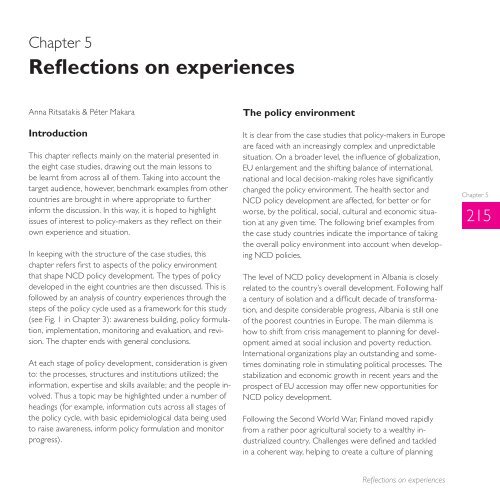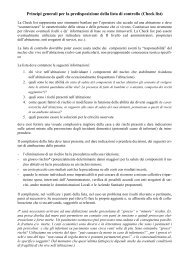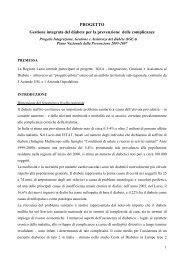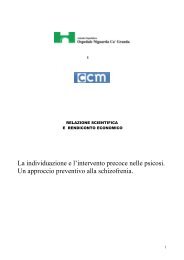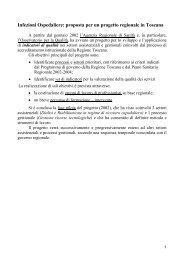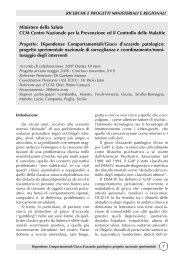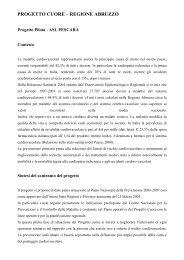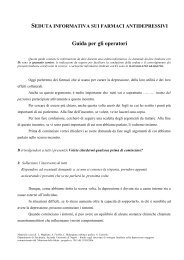Gaining health : analysis of policy development in European ...
Gaining health : analysis of policy development in European ...
Gaining health : analysis of policy development in European ...
You also want an ePaper? Increase the reach of your titles
YUMPU automatically turns print PDFs into web optimized ePapers that Google loves.
Chapter 5<br />
Reflections on experiences<br />
Anna Ritsatakis & Péter Makara<br />
Introduction<br />
This chapter reflects ma<strong>in</strong>ly on the material presented <strong>in</strong><br />
the eight case studies, draw<strong>in</strong>g out the ma<strong>in</strong> lessons to<br />
be learnt from across all <strong>of</strong> them. Tak<strong>in</strong>g <strong>in</strong>to account the<br />
target audience, however, benchmark examples from other<br />
countries are brought <strong>in</strong> where appropriate to further<br />
<strong>in</strong>form the discussion. In this way, it is hoped to highlight<br />
issues <strong>of</strong> <strong>in</strong>terest to <strong>policy</strong>-makers as they reflect on their<br />
own experience and situation.<br />
In keep<strong>in</strong>g with the structure <strong>of</strong> the case studies, this<br />
chapter refers first to aspects <strong>of</strong> the <strong>policy</strong> environment<br />
that shape NCD <strong>policy</strong> <strong>development</strong>. The types <strong>of</strong> <strong>policy</strong><br />
developed <strong>in</strong> the eight countries are then discussed. This is<br />
followed by an <strong>analysis</strong> <strong>of</strong> country experiences through the<br />
steps <strong>of</strong> the <strong>policy</strong> cycle used as a framework for this study<br />
(see Fig. 1 <strong>in</strong> Chapter 3): awareness build<strong>in</strong>g, <strong>policy</strong> formulation,<br />
implementation, monitor<strong>in</strong>g and evaluation, and revision.<br />
The chapter ends with general conclusions.<br />
At each stage <strong>of</strong> <strong>policy</strong> <strong>development</strong>, consideration is given<br />
to: the processes, structures and <strong>in</strong>stitutions utilized; the<br />
<strong>in</strong>formation, expertise and skills available; and the people <strong>in</strong>volved.<br />
Thus a topic may be highlighted under a number <strong>of</strong><br />
head<strong>in</strong>gs (for example, <strong>in</strong>formation cuts across all stages <strong>of</strong><br />
the <strong>policy</strong> cycle, with basic epidemiological data be<strong>in</strong>g used<br />
to raise awareness, <strong>in</strong>form <strong>policy</strong> formulation and monitor<br />
progress).<br />
The <strong>policy</strong> environment<br />
It is clear from the case studies that <strong>policy</strong>-makers <strong>in</strong> Europe<br />
are faced with an <strong>in</strong>creas<strong>in</strong>gly complex and unpredictable<br />
situation. On a broader level, the <strong>in</strong>fluence <strong>of</strong> globalization,<br />
EU enlargement and the shift<strong>in</strong>g balance <strong>of</strong> <strong>in</strong>ternational,<br />
national and local decision-mak<strong>in</strong>g roles have significantly<br />
changed the <strong>policy</strong> environment. The <strong>health</strong> sector and<br />
NCD <strong>policy</strong> <strong>development</strong> are affected, for better or for<br />
worse, by the political, social, cultural and economic situation<br />
at any given time. The follow<strong>in</strong>g brief examples from<br />
the case study countries <strong>in</strong>dicate the importance <strong>of</strong> tak<strong>in</strong>g<br />
the overall <strong>policy</strong> environment <strong>in</strong>to account when develop<strong>in</strong>g<br />
NCD policies.<br />
The level <strong>of</strong> NCD <strong>policy</strong> <strong>development</strong> <strong>in</strong> Albania is closely<br />
related to the country’s overall <strong>development</strong>. Follow<strong>in</strong>g half<br />
a century <strong>of</strong> isolation and a difficult decade <strong>of</strong> transformation,<br />
and despite considerable progress, Albania is still one<br />
<strong>of</strong> the poorest countries <strong>in</strong> Europe. The ma<strong>in</strong> dilemma is<br />
how to shift from crisis management to plann<strong>in</strong>g for <strong>development</strong><br />
aimed at social <strong>in</strong>clusion and poverty reduction.<br />
International organizations play an outstand<strong>in</strong>g and sometimes<br />
dom<strong>in</strong>at<strong>in</strong>g role <strong>in</strong> stimulat<strong>in</strong>g political processes. The<br />
stabilization and economic growth <strong>in</strong> recent years and the<br />
prospect <strong>of</strong> EU accession may <strong>of</strong>fer new opportunities for<br />
NCD <strong>policy</strong> <strong>development</strong>.<br />
Follow<strong>in</strong>g the Second World War, F<strong>in</strong>land moved rapidly<br />
from a rather poor agricultural society to a wealthy <strong>in</strong>dustrialized<br />
country. Challenges were def<strong>in</strong>ed and tackled<br />
<strong>in</strong> a coherent way, help<strong>in</strong>g to create a culture <strong>of</strong> plann<strong>in</strong>g<br />
Chapter 5<br />
215<br />
Reflections on experiences


